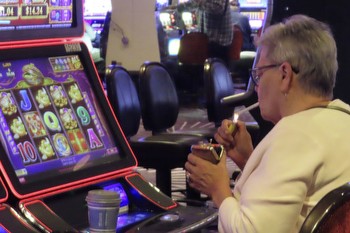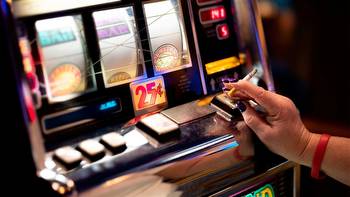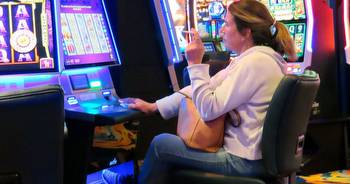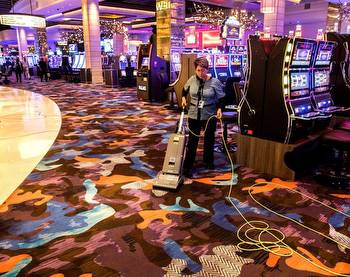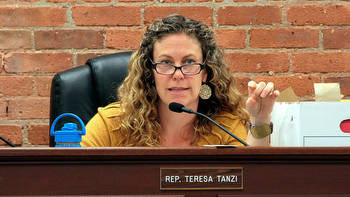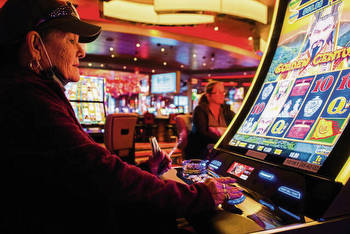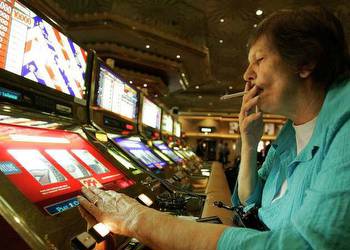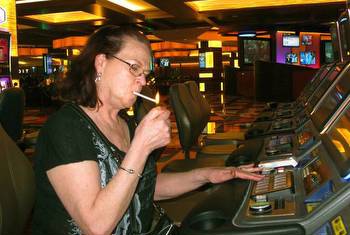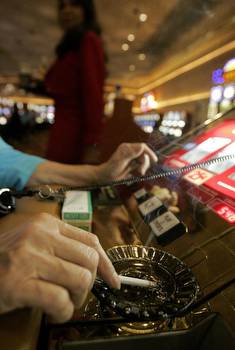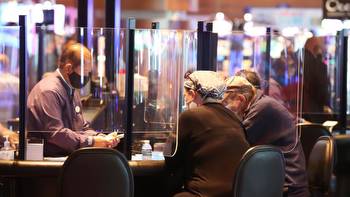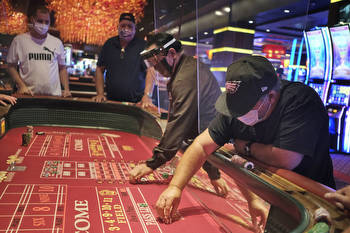Decadeslong push to end smoking in casinos finds new audience: shareholders
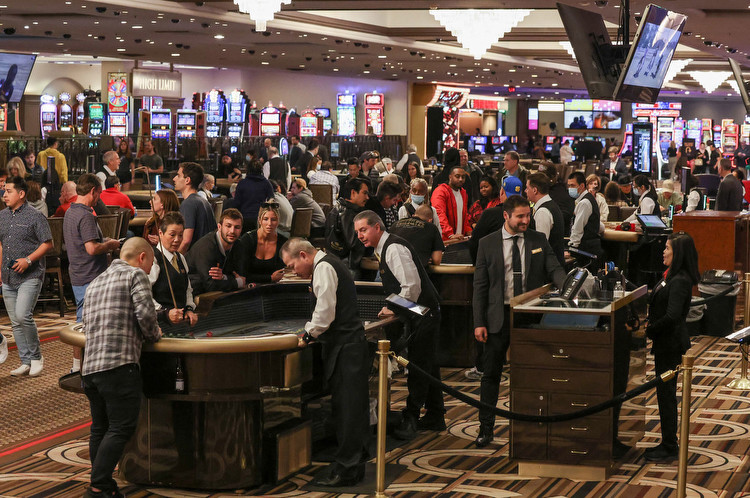
Nevada casino operators, who oversee maybe the last holdouts in a world that’s rapidly going smoke-free, are being asked to change their ways by an unusual audience — their shareholders.
Advocates who have long sought to ban smoking inside Nevada casinos have joined stockholders in presenting a proposal to other investors in three casino companies that would require corporate management to commission a report and disclose its findings on potential cost savings from implementing a smoke-free policy at their properties.
Shareholders in Caesars Entertainment, Boyd Gaming and Bally’s Corp. are voting over the next two months on proposals that could end smoking inside the companies’ casinos on the Strip, downtown, Lake Tahoe and in local customer markets.
The three companies oppose the effort, which is backed by Trinity Health, a national, nonprofit health care network, and Americans for Nonsmokers’ Rights (ANR), a policy organization that has included the gaming industry as a target since the 1980s. The companies have asked shareholders to reject the proposal.
Paula Larson-Schusster, the president of United Auto Workers (UAW) Local 355, whose organization represents some 3,000 dealers and casino floor workers in Las Vegas, told The Nevada Independent the coalition backing the shareholder effort believes casino companies “will get on board” once the cost savings from banning smoking is known.
Larson-Schusster, who is not a smoker, said her health and life insurance classify her as a smoker because she is exposed to smoke much of the day.
“This is not going to affect their business,” she said. “It will probably cut health care costs, cleaning costs and other general expenses.”
Bronson Frick, director of advocacy for ANR, said in an interview that the organization has been considering an effort through shareholders for several years. Much of the advocacy has been relegated to demonstrations during high-profile gaming events, such as outside the Venetian Expo during the annual Global Gaming Expo (G2E).
“Simply having the issue before the company’s shareholders will help raise awareness,” Frick said.
Proponents believe the timing is in their favor. Last month, the Nevada Tobacco Control and Smoke-free Coalition released results of a survey that polled 800 registered Nevada voters where nearly 60 percent favored making all workplaces — including casinos — smoke-free environments.
Conducted by Washington, D.C., based Normington Petts, the survey found the same majority of respondents would support a smoking ban, even when presented with arguments that ending indoor smoking could potentially hurt casinos economically.
“The main takeaway from this research is that Nevada voters’ support for 100 percent smoke-free workplaces, including in casinos, is strong, consistent, and resilient,” Normington Petts partner Jill Normington said in a statement.
ANR has cited research showing the number of people smoking has declined over time, finding 9 out of 10 casino patrons don’t smoke.
Frick said casino company executives “can't bury their head in the sand on this issue” if shareholders vote to commission a study on the concept. He noted that Nevada casino companies operate in many of the 10 states that have casino smoking bans, including Ohio, Maryland, New York, Colorado and Massachusetts.
“The trend is underway,” Frick said. “This is an important standard to consider for shareholders to consider as it relates to improving the bottom line for business.”
Nicole Chacon, manager of the Nevada Tobacco Control and Smoke-free Coalition, said nonsmoking supporters are considering their options based on the polling results, including a legislative effort or through a ballot referendum.
She said the 20-point margin in favor of a smoke-free environment gives proponents hope.
“The poll wasn't geared toward one way of making this happen,” Chacon said. “Another thing we found was voters would favor elected officials who support making casinos smoke-free. All this information is important. We're encouraged by the results.”
Chacon also pointed toward a University of Nevada, Reno study that found secondhand smoke in indoor casino areas can be 18 times more harmful than when smoking takes place outside.
“People should be aware that when they go into any establishment that allows smoking, there is an unhealthy level of second-hand exposure, especially for those individuals who have acute risk factors,” associate professor Eric Crosbie said in a statement.
UAW was also buoyed by the polling results. The union has long sought to curtail smoking on casino floors, citing health issues when a person is exposed to smoke eight hours a day.
Larson-Schusster, who works as a dealer at Flamingo Las Vegas, said perceptions changed during the pandemic when rules that didn’t allow smoking at the gaming tables were implemented by state casino regulators.
“I think they discovered how much more fun and how much nicer it was to play when you didn't have some guy waving his cigarette in your face,” Larson-Schusster said. “I think it's due to the education that has come about in the last few years. Smoking creates a toxic environment.”
Fighting the proxy votes
The gaming companies asked the Securities and Exchange Commission for permission to remove the shareholder smoking study proposal from their proxy statements — an SEC-required document companies provide to shareholders with information about voting matters during annual meetings. The agency rejected the requests.
“In our view, the proposal transcends ordinary business matters and does not seek to micromanage the company,” the SEC wrote in its response,
Operators declined to comment publicly on the effort involving shareholders but the three companies provided lengthy recommendations in their proxy statements that ask shareholders to reject the question.
“We believe this proposal is the first step toward forcing our company to unilaterally adopt such a policy, regardless of the actions of our competitors,” Boyd, which operates 28 casinos in 10 states, including 10 properties in the Las Vegas area, wrote in its recommendation to reject the request. “We are focused on the issues covered by the proposal as we are with all other ways we can best cater to our customers.”
Caesars, which operates 52 casinos in 18 states, including nine Strip resorts, wrote the company complies with state and municipal laws regulating smoking.
“[We] do not believe that the proposal would be an effective use of company resources,” Caesars wrote. “Determining the smoking policy for our properties is a complex business decision and we believe our current policies strike the appropriate balance in appealing to both smoking and non-smoking customers.”
Bally’s, which operates Bally’s Lake Tahoe, told shareholders it “believes compliance with local legal requirements relating to smoking in casinos together with the company’s existing policies and practices makes the proposal unwarranted and unreasonable.”
Frick said shareholders of MGM Resorts International withdrew their proxy request because conversations on the issue are taking place with management. Park MGM is the only nonsmoking hotel-casino on the Strip. The company kept the nonsmoking status in place after pandemic-related smoking prohibitions in casinos were lifted in 2022.
In the shareholders' proxy request, comments were included from Marc Oppenheimer, chief marketing officer for Parx Casino near Philadelphia, who told a gaming publication the casino saw a positive effect on the health and morale of employees after going smoke-free.
On Wednesday, according to a transcript provided by a communications representative for ANR, an MGM shareholder asked company officials during its annual meeting if it would evaluate the benefits of transitioning to a smoke-free indoor air policy.
“We comply with all state and municipal laws regulating smoking at our properties, and in some instances have gone beyond that,” an unnamed company official responded, citing Park MGM. “We continually assess preferences to inform and address our business practices.”
An MGM spokesman did not respond to requests for comment.
2006 Clean Air Act exempted casinos
Hotels and motels, retail tobacco stores, strip clubs, brothels and casino gaming floors were exempted when voters approved the 2006 Nevada Clean Air Act, a referendum that passed with 53.9 percent approval.
The measure prohibited the use of tobacco products inside workplaces and most indoor public businesses, including restaurants.
While casino floors were left alone, another faction of the Nevada gaming industry — neighborhood taverns, which offered bartop slot machines but also operated small restaurants — saw their business put into turmoil 18 years ago.
The locations could only allow indoor smoking if they eliminated the kitchens.
Nevada lawmakers in 2011 changed the tavern restrictions. Smoking could coexist with food service and gaming, but entry was restricted to age 21 and over. If a location walled off the smoking area from the restaurant space, patrons under the age of 21 could be admitted.
Atlantic City targeted
Nonsmoking gaming areas are becoming more commonplace in casinos, including Las Vegas.
As part of a multimillion-dollar redevelopment last year, the Plaza downtown added a 2,500-square-foot nonsmoking slot machine lounge with a separate entrance from the main casino. The space was created in partnership with slot machine influencer Brian Christopher, who has told his YouTube audience he only visits smoke-free casinos.
At the Global Gaming Expo in Las Vegas last year, a first-ever panel discussion on smoking in casinos included ideas on reimagining gaming spaces to accommodate both smokers and nonsmokers. Traci Kennedy, the Midwest strategist for ANR, called indoor smoking “quite antiquated.”
ANR has focused much of its attention in the past few years on trying to end smoking on casino floors in Atlantic City’s seven casinos.
While businesses throughout New Jersey fall under smoking bans, the activity is still allowed on 25 percent of a casino’s gaming floor. Anti-smoking advocates said the areas are not contiguous, meaning secondhand smoke is present throughout the property.











